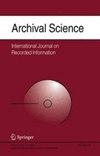Introducing the legacies and trajectories of trauma to the archival field
Abstract
Trauma as a concept, a signifier and a frame has become increasingly visible in archival theory and praxis in recent years. A shift that is perhaps unsurprising given that society at large appears to have embraced trauma as a major interpretative category for our age. The recent spotlight on trauma can also be linked to accompanying movements in our discourse as we have begun to unpack and theorise the affective dimensions of records work and have moved towards more person-centred approaches. While the recent introduction of trauma-informed approaches to our field is a welcome development in many ways, this article seeks to critically engage with the Western concept of trauma to expose its intellectual lineages and the social and moral economies that have shaped its emergence in different spheres; and highlight how archival studies discourse on trauma is shaped in relation to different branches of Western trauma discourse. This article argues that as archivists and records workers adopt the language of trauma from adjacent arenas as an explanatory and transformative frame, it is vital that we do so in possession of an understanding of trauma’s conceptual legacies and in conversation with broader affective, liberatory and reparative framings. The article is written in the spirit of becoming truly ‘trauma-informed’.

 求助内容:
求助内容: 应助结果提醒方式:
应助结果提醒方式:


